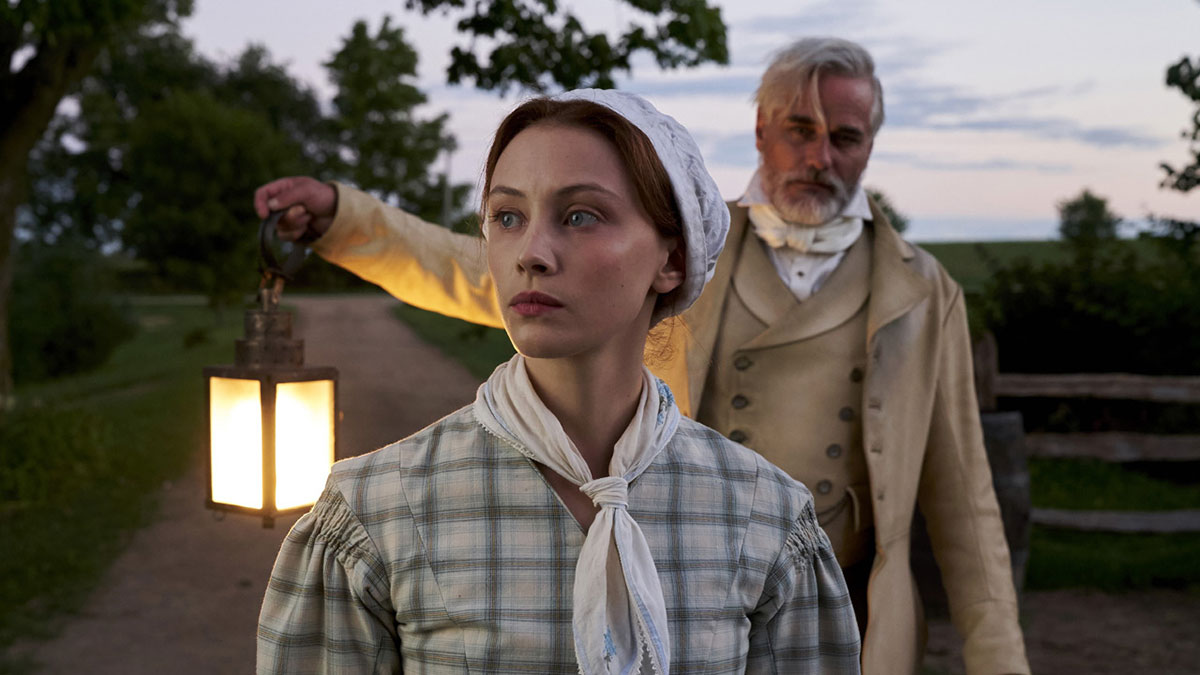Hike up your petticoats and knot up your kerchiefs, because it’s time for another Bingeworthy Breakdown! This time we’re spotlighting “Alias Grace,” a co-production between Netflix and the CBC that hit Canada earlier this fall but comes to Netflix on Friday, Nov. 3.
This six-episode miniseries set in the mid-19th century follows convicted murderess Grace Marks as she recounts her life to psychiatrist Dr. Jordan. Jordan has been hired by a local minister to try and prove Grace’s innocence and win her a pardon. The thing is, Grace can’t remember whether she actually helped murder her master and his housekeeper. Subtle violence, Puritan eroticism, and quiltmaking ensue.
“Alias Grace,” directed by Mary Harron (“I Shot Andy Warhol,” “American Psycho”) and written by Sarah Polley (“Away from Her,” “Stories We Tell”), is based on the eponymous novel by every streaming service’s favorite trenchant feminist, Margaret Atwood. Yes, “The Handmaid’s Tale” isn’t the only Atwood adaptation on the block anymore, and the well-made, smartly scripted “Alias Grace” should earn comparable critical praise.

All right, hit me. What’s this show about?
As the pilot dawns, Grace Marks has been languishing in prison for 15 years. So the story goes, she and fellow servant McDermott joined together to kill their master and his housekeeper. McDermott, the only other survivor of the event, has since been hanged, meaning Grace has the final word on everything that happened on that fateful day. Unfortunately, she has no memory of the day. A local reverend calls in psychiatrist Dr. Simon Jordan to unearth the truth, in the hope that he will endorse Grace’s pardoning. Grace is wary of Jordan at first, having faced medical abuse while in prison and, previously, an insane asylum. She eventually agrees to tell him her life story leading up to the murders, and the show unfurls via both flashback and the present-day narrative. It’s stark. It’s dryly feminist. It’s very Atwoodian.
Man, if you’d told me a few years ago that 2017 would be the year of Margaret Atwood, I would have laughed in your face.
Right? Canada’s pride and joy is finally getting her day in the sun – or rather, on the screen. It’s cool to see, considering how desperately our society needs more feminist messages. And it’s even cooler to see her work adapted by two women (no offense, “The Handmaid’s Tale” creator Bruce Miller). An Atwood adaptation directed by the woman who helmed a Valerie Solanas biopic? I practically peed my third-wave pants when I found out about this series.
Honestly, I’m worn out on political talk. Any other reasons to be excited about the series?
Yes. “Alias Grace” is an unflinching period piece, set in mid-19th century Canada. Of course, there is murder. There are insane asylum flashbacks. There is hypnotism. There is lust. There are lost souls (literally). There is a lot – and I mean a lot – of vomiting.
Wow. Doesn’t sound like your typical period piece.
Yes and no. The editing in this show is awesome, as is the way it treats gore. The pilot is typical period fare laced through with violent visual flashes. When something grisly does go down, it does so with none of the fanfare typically present in today’s shock-obsessed programming. On the period piece downside, a noticeable amount of the dialogue comes off as stiff and unnatural. Whether that’s in the script or the actors is anybody’s guess, but I’d say it’s a mix of the two.
Yikes, so the acting’s bad?
I’m not trying to say the acting is bad per se, just that portions of the dialogue seem difficult to carry. Aside from that, I quite enjoyed most of the show’s performances. “Chuck” star Zachary Levi, for instance, has an endearing and enigmatic turn as Jeremiah, an eccentric peddler. For some reason, David f*cking Cronenberg blesses this show as the reverend. Edward Holcroft and his noble nose expertly portray the complex Dr. Jordan as both detestable and sympathetic. Overall, though, Sarah Gadon is fantastic as Grace, and not just because of her sweet Irish accent. As she skillfully dances between cold and mysterious in the present-day storyline and naïve and charming in flashback, the magnetic actor keeps you wondering. She deserves all kinds of awards just for her performance in the last episode, which borders on Eva Green-in-“Penny Dreadful” levels of amazing.
Conversely, Anna Paquin doesn’t exactly dazzle as the ambivalent housekeeper Nancy, and Rebecca Liddiard has a mixed turn as fiery best friend Mary. They both offer fairly one-note performances, perhaps because they’re sharing screen time with the astoundingly nuanced Gadon.





